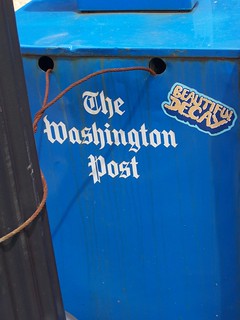A contributing factor to the Washington Post's decline
The Columbia Journalism Review, in "The Washington Post Co.’s Self-Destructive Course: Dividends, share buybacks, and an anti-paywall stance help bleed the paper dry," tells us that besides the fact that the newspaper industry is declining because their revenue model (selling print-based advertising to national and local advertisers, along with classified advertising) no longer works in an Internet-connected world, which also works to reduce the value of the printed product, while revenues from Internet-based advertising and circulation are not equal to the loss of print-based advertising, the Washington Post Company uses a significant part of its revenue to pay stock dividends and do stock buybacks, which benefit the Graham family.

Some month's back I bought an old issue of the Saturday Evening Post which had an article on Studebaker Motor Company, which was the first major corporation to enter bankruptcy but the corporation wasn't liquidated. As the company entered the Depression, it continued to pay high dividends (through borrowing, as revenues dropped), and eventually this practice drove the company to bankruptcy.
There are other issues for the Washington Post Company too, decline in the revenue from the Kaplan Education Company--which used to be a major source of income--is a big one, among others.
I mention this only because as a "local" newspaper, the fact that the newspaper has cut half its journalists has significantly and negatively impacted the newspaper's ability to provide local news coverage, of which lately, it seems to provide very little (these days most of the content in the Metro section seems to be generated by police and other criminal justice announcements).
This concerns me in the here and now, because you need "mass media" to inform and engage citizens on issues in their communities.
But also I am concerned about the historians of the future having to work much much harder to find primary source materials, because the "local" newspaper of today has few of the kinds of articles that I have read over the years from the period 1900-1985, articles that helped educate me about various aspects of the city and its history.
Labels: civic engagement, community building, media and communications, participatory democracy and empowered participation, urban history



0 Comments:
Post a Comment
<< Home